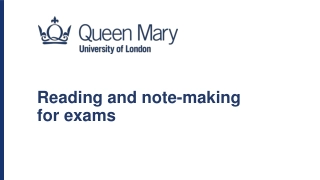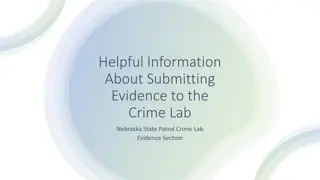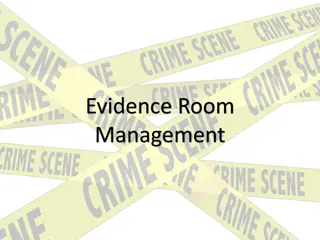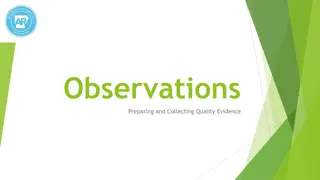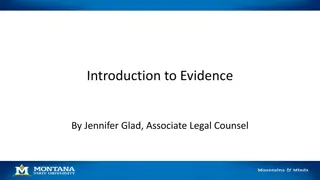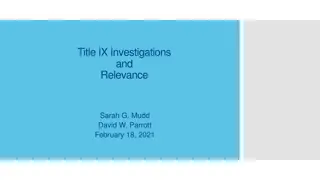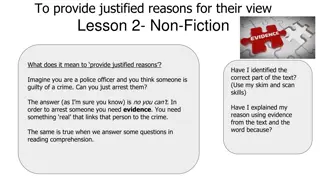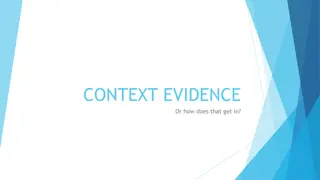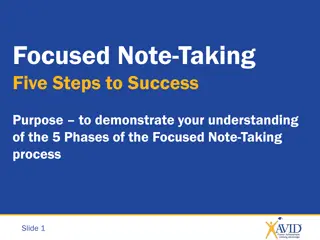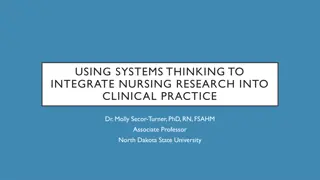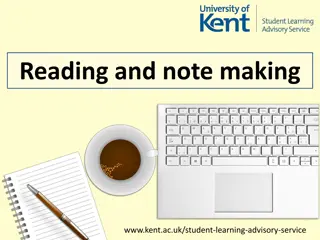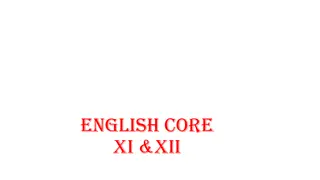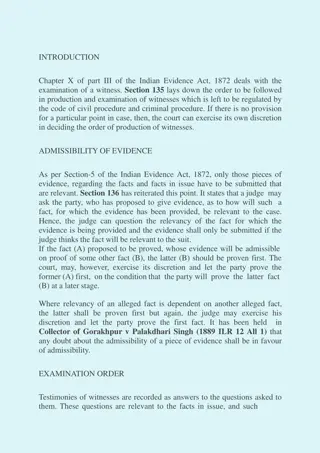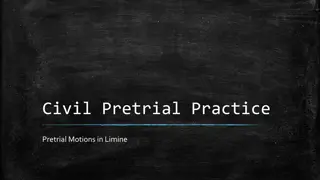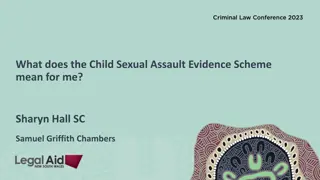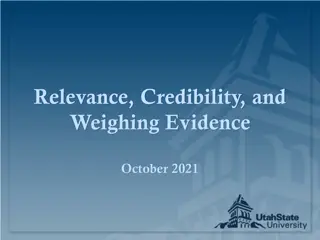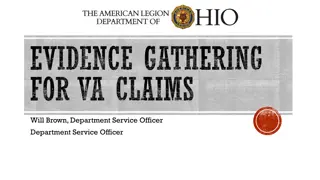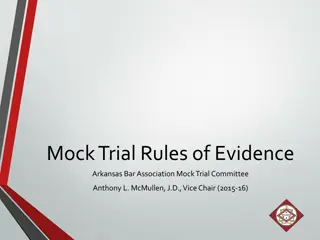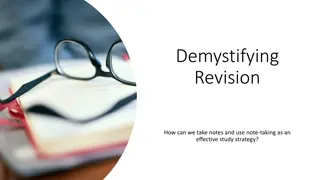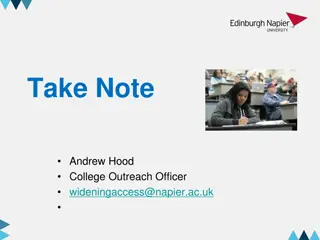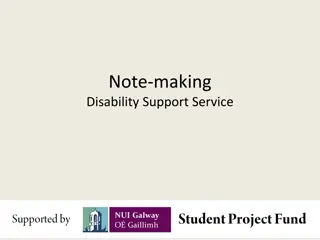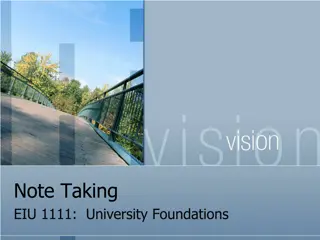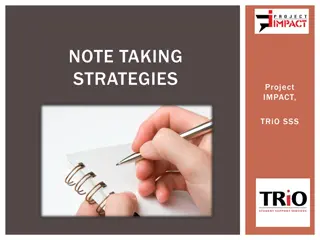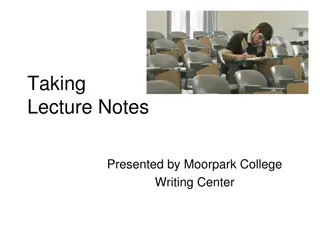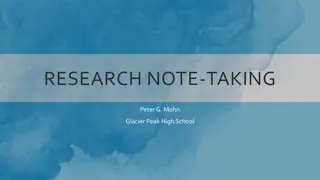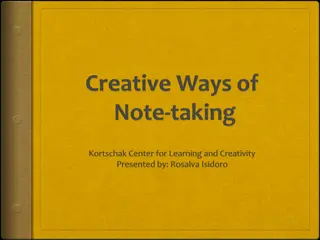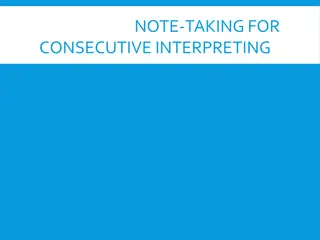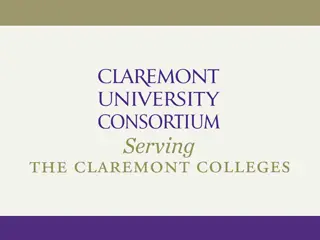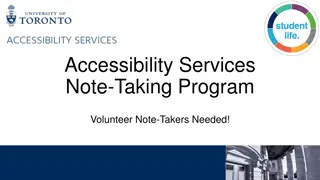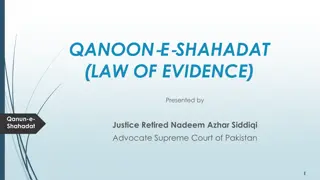Effective Note-Taking Strategies for Academic Success
Explore various note-taking methods discussed by Caroline Havery from UTS, such as annotating texts, creating tables for organized notes, and comparing personal note-taking styles with suggested approaches. Understand the importance of reading in depth and summarizing key points to enhance comprehen
0 views • 29 slides
Effective Note-Making Strategies for Exam Preparation
Understand the importance of selective reading and note-making for exams. Learn what to read and what to avoid, along with tips on making efficient notes. Being selective, focusing on quality over quantity, and using effective note-making techniques can enhance your exam revision process.
0 views • 13 slides
The Role of Artifacts and Evidence in Educator Evaluation and Support
Exploring the role of artifacts and evidence in educator evaluation, this content covers the three categories of evidence required by the Oregon Framework. It delves into the efficient process that reduces redundancy, essential components of SLG goals, and the types of evidence relevant to professio
0 views • 15 slides
Understanding Impression Evidence Collection in CSI Investigations
Impression evidence plays a crucial role in investigations, including shoeprints, tool marks, tire tracks, bite marks, and riffling marks on bullets. This evidence can be collected in 2D using photography or tape lifts, and in 3D through casting methods. Differentiating between class and individual
0 views • 21 slides
Helpful Information About Submitting Evidence to the Crime Lab.
Helpful information about submitting evidence to the Nebraska State Patrol Crime Lab's Evidence Section. Learn about the NSP 750 Evidence Submittal Form, submission process, and guidelines for resubmissions. Ensure all necessary details are provided for proper analysis of evidence.
5 views • 16 slides
Illegally obtained evidence
Illegally obtained evidence refers to evidence acquired through unlawful means, such as searches without warrants or extraction under duress. The Fruit of the Poisonous Tree doctrine renders evidence inadmissible if derived from illegally obtained evidence. The Exclusionary Rule prohibits the use of
2 views • 30 slides
Evidence Room Management
Explore the intricacies of evidence room management in a law enforcement setting, including the roles of individuals like Greg Van Buskirk, differences in crime scene management between large and small departments, the distinction between property and evidence, the importance of maintaining chain of
0 views • 8 slides
Enhancing Evidence Collection in Education
Explore the importance of minimizing bias in evidence collection, review different types of evidence, identify strategies to collect quality evidence effectively, understand common biases affecting assessment, and learn to spot and address biased statements. Practice eliminating biased language and
0 views • 11 slides
Understanding Evidence in Investigations
Learn about the principles and types of evidence in investigations, including inculpatory and exculpatory evidence, physical, documentary, demonstrative, and verbal evidence. Explore sources of evidence and the significance of collecting relevant information to ensure a fair investigative process.
0 views • 14 slides
Understanding Title IX Investigations and the Role of Evidence Collection
The purpose of a Title IX investigation is to collect relevant evidence, both inculpatory and exculpatory, to allow for impartial decision-making regarding reported sexual harassment cases. Parties involved must receive sufficient notice and have opportunities to participate, present statements, and
1 views • 32 slides
Providing Justified Reasons in Reading Comprehension
Providing justified reasons in reading comprehension involves using evidence from the text to support one's answer, similar to presenting evidence in a legal case. Just as a police officer needs evidence to make an arrest, readers need textual evidence and the word "because" to support their respons
0 views • 11 slides
Understanding Context Evidence in Legal Proceedings
Context evidence in legal proceedings refers to evidence of acts not charged in the indictment, used to provide a background for understanding specific allegations. This type of evidence is often relied upon by the prosecution to explain events or behaviors that may seem isolated or surprising. It i
1 views • 13 slides
Mastering the Five Phases of Focused Note-Taking Process
Explore the essential steps of the focused note-taking process, from taking initial notes to processing, connecting, summarizing, and reflecting on learning. Understand the guiding principles and detailed phases to enhance your note-taking skills effectively.
0 views • 19 slides
Integrating Nursing Research into Clinical Practice with Systems Thinking
Dr. Molly Secor-Turner emphasizes the importance of evidence-based practice (EBP) in nursing. EBP, derived from rigorous research, leads to quality patient outcomes by aligning services with current knowledge. The process involves identifying problems, critiquing evidence, implementing recommendatio
0 views • 21 slides
Effective Reading and Note-Taking Strategies for Academic Success
Reading and Note-Making Guide from Kent.ac.uk emphasizes the importance of efficient reading and note-taking techniques for academic success. It covers methods to find relevant sources, determining the amount of reading required, and the concept of active reading. By following these strategies, stud
0 views • 20 slides
Mastering Note-Making Skills for Effective Learning
Note-making is a crucial skill for condensing large volumes of information into concise, organized summaries. It aids in remembering key details, preparing for exams, planning presentations, and engaging in discussions. This practice requires selecting and extracting relevant data, using abbreviatio
1 views • 20 slides
Examination of Witnesses under Indian Evidence Act, 1872
Chapter X of Part III of the Indian Evidence Act, 1872, outlines the process of examining witnesses, including the order of production and admissibility of evidence. Sections 135 to 141 delve into the rules governing the examination-in-chief, cross-examination, and re-examination of witnesses, empha
2 views • 8 slides
Understanding Pretrial Motions in Limine in Civil Pretrial Practice
Pretrial motions in limine (MIL) play a crucial role in civil pretrial practice by seeking evidentiary rulings in advance to control the introduction of evidence at trial. These motions aim to prevent the admission of irrelevant, inadmissible, or prejudicial evidence and can also facilitate the intr
2 views • 17 slides
Understanding the Child Sexual Assault Evidence Scheme
The Child Sexual Assault Evidence Scheme is a significant initiative that facilitates child sexual assault trials by introducing witness intermediaries and pre-recording of children's evidence. It applies to prescribed sexual offences and mandates specific provisions for hearings and evidence presen
1 views • 16 slides
Understanding Evidence-Based Medicine and Clinical Decision-Making
European Patients Academy on Therapeutic Innovation emphasizes the importance of Evidence-Based Medicine (EBM) in providing optimum clinical care. EBM involves systematic review and utilization of clinical research for informed decision-making, benefiting patients in disease management and treatment
7 views • 20 slides
Understanding Relevance, Credibility, and Weighing Evidence in Decision-Making
Explore the importance of relevance and credibility in evidence assessment, the role of hearing panels in evaluating evidence fairly, and the responsibilities they hold. Learn about presenting relevant evidence, policy analysis, and identifying irrelevant evidence to ensure a thorough review process
6 views • 32 slides
Mastering Claims, Evidence, and Warrants for Persuasive Writing
Understanding the concepts of claims, evidence, and warrants is crucial for constructing persuasive arguments. Claims represent positions to persuade, evidence supports claims with facts, and warrants bridge the gap between evidence and claims. An exercise is outlined to help practice forming claims
0 views • 8 slides
Understanding Biased Assimilation and Attitude Polarization in Social Disputes
People with strong opinions on complex social issues tend to interpret evidence in a biased manner, accepting confirming evidence readily while subjecting disconfirming evidence to critical evaluation. This can lead to increased polarization rather than narrowing of disagreement when exposed to the
0 views • 20 slides
Transformation of Quality Assessment Framework in Healthcare
The healthcare quality assessment framework is evolving with a new strategy focused on data-led, people's experiences, care integration, and safety culture. The current framework is transitioning towards a new approach by late 2023, incorporating separate registration and monitoring processes, five
0 views • 14 slides
Understanding Evidence Gathering for VA Claims with The American Legion Department of Ohio
Evidence is crucial for VA claims, and it can come in various forms such as documents, written statements, photos, and video recordings. The framework for evaluating evidence includes factors like relevance, competence, credibility, and weight. Understanding the types of evidence, forms of relevance
0 views • 14 slides
Understanding Mock Trial Rules of Evidence
Mock Trial Rules of Evidence are crucial for determining the admissibility of testimony and evidence in a trial setting. Students preparing for cases need to assess evidence admissibility, make timely objections, and be prepared to defend testimony. The rules cover objections, specific objections ty
0 views • 36 slides
Effective Note-Taking Strategies for Better Study Results
Discover effective study strategies for note-taking, memory platforms, and the Leitner method to enhance learning, retention, and revision. Avoid distractions, use Cornell Notes templates, and optimize flashcards for efficient studying. Learn the importance of automaticity in learning and benefit fr
0 views • 13 slides
Effective Note-Taking Strategies for College Success
Enhance your college learning experience with effective note-taking strategies. Understand the importance of note-making, learn how to prepare for lectures, make notes during classes, and utilize lecturer signposting. Discover why notes are vital for memory retention and exam preparation. Improve yo
0 views • 21 slides
Practice and Procedure in Judicial Review: Factual Evidence and Interveners
The content provides valuable insights into the practice and procedure regarding factual evidence and interveners in judicial review cases. It covers general rules, recent cases, applications for oral evidence, questioning witnesses, opinion evidence, and the role of interveners. Key points include
0 views • 28 slides
Effective Note-Making Strategies for Students
Studies have shown that note-making is crucial for retaining information. This guide provides tips on how to improve your note-making skills, including preparing before class, taking notes during class, and reviewing notes after class. Techniques such as the Cornell Note-Making Method are discussed
0 views • 13 slides
Effective Note-Taking Strategies for University Success
Enhance your university experience with these valuable tips: commit to class attendance, concentrate during lectures, connect ideas to enhance understanding, and develop your own note-taking style using methods like Cornell and Question Technique. Explore different note-taking styles and utilize too
0 views • 15 slides
Effective Note-Taking Strategies for Educational Success
Explore various note-taking strategies, challenges faced during lectures, options for formatting notes, organizational techniques, and tech tools like Microsoft OneNote and Evernote. Learn how to optimize your note-taking process for better retention and comprehension in academic settings.
0 views • 28 slides
Effective Note-Taking Strategies for Academic Success
Enhance your note-taking skills with guidance from Moorpark College Writing Center. Learn the process of note-taking, including observing the instructor and yourself, recording key words, using image prompting, mapping, Cornell Method, and summarization. Understand the importance of reviewing notes
0 views • 17 slides
Effective Note-Taking Methods and Their Characteristics
Explore various note-taking methods such as Cornell, outlining, and mapping, each with its advantages and disadvantages. Understand how these methods can be utilized in research, lectures, and meetings to enhance organization, reviewing, and understanding of key information. Dive into the specifics
0 views • 17 slides
Effective Note-Taking Strategies for Academic Success
Good note-taking skills are essential for academic achievement. This comprehensive guide covers the importance of note-making, reasons to take notes, effective strategies, and the benefits of electronic note-taking. Learn how to preview class content, stay focused, and develop a system that works be
0 views • 15 slides
The Art of Effective Note-Taking and Reviewing for Enhanced Learning
Learn the importance of effective note-taking in enhancing learning through active working memory and creative methods like graphic organizers, matrices, concept maps, and mind maps. Discover different note-taking representations to improve information retention and understanding. Explore the benefi
0 views • 11 slides
Effective Note-Taking for Consecutive Interpreting
Importance of developing note-taking skills in community interpreting to avoid interrupting speakers, use of digital recorders in court for long consecutive interpreting, considerations for emotionally charged settings, and principles for effective note-taking in interpreting practice. The significa
0 views • 40 slides
Note Taker Training for Disability Services
Congratulations on being selected as a note taker for Disability Services! This training provides guidelines for note takers, reasons for note taking accommodations, and benefits for both students and note takers. Learn about the laws protecting students with disabilities, eligibility for note takin
0 views • 23 slides
Volunteer Note-Takers Needed for Accessibility Services Note-Taking Program
Help your fellow students living with disabilities achieve academic success by volunteering as a note-taker. Improve your own note-taking skills while supporting others. Minimal time commitment required. Register online and upload your notes after each class. Certificate of Appreciation provided. Co
0 views • 5 slides
Understanding Qanun-e-Shahadat: Law of Evidence in Pakistan
Qanun-e-Shahadat Order 1984 replaced the Evidence Act of 1872 in Pakistan, aiming to align the law of evidence with Islamic principles. This law is crucial for judicial proceedings, governing the admissibility of oral and documentary evidence, primary and secondary evidence, and resolving conflicts
0 views • 22 slides

